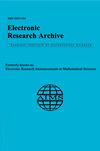A selective evolutionary heterogeneous ensemble algorithm for classifying imbalanced data
IF 1
4区 数学
Q1 MATHEMATICS
引用次数: 0
Abstract
Learning from imbalanced data is a challenging task, as with this type of data, most conventional supervised learning algorithms tend to favor the majority class, which has significantly more instances than the other classes. Ensemble learning is a robust solution for addressing the imbalanced classification problem. To construct a successful ensemble classifier, the diversity of base classifiers should receive specific attention. In this paper, we present a novel ensemble learning algorithm called Selective Evolutionary Heterogeneous Ensemble (SEHE), which produces diversity by two ways, as follows: 1) adopting multiple different sampling strategies to generate diverse training subsets and 2) training multiple heterogeneous base classifiers to construct an ensemble. In addition, considering that some low-quality base classifiers may pull down the performance of an ensemble and that it is difficult to estimate the potential of each base classifier directly, we profit from the idea of a selective ensemble to adaptively select base classifiers for constructing an ensemble. In particular, an evolutionary algorithm is adopted to conduct the procedure of adaptive selection in SEHE. The experimental results on 42 imbalanced data sets show that the SEHE is significantly superior to some state-of-the-art ensemble learning algorithms which are specifically designed for addressing the class imbalance problem, indicating its effectiveness and superiority.不平衡数据分类的选择进化异构集成算法
从不平衡数据中学习是一项具有挑战性的任务,因为对于这种类型的数据,大多数传统的监督学习算法倾向于大多数类,它比其他类具有更多的实例。集成学习是解决不平衡分类问题的一种鲁棒解决方案。为了构建一个成功的集成分类器,应该特别注意基分类器的多样性。本文提出了一种新的集成学习算法——选择性进化异构集成(SEHE),该算法通过两种方式产生多样性:1)采用多种不同的采样策略生成不同的训练子集;2)训练多个异构基分类器构建集成。此外,考虑到一些低质量的基分类器可能会降低集成的性能,并且很难直接估计每个基分类器的潜力,我们利用选择性集成的思想自适应地选择基分类器来构建集成。特别地,采用了一种进化算法来进行自适应选择。在42个不平衡数据集上的实验结果表明,SEHE明显优于一些专门针对类不平衡问题而设计的最新集成学习算法,表明了其有效性和优越性。
本文章由计算机程序翻译,如有差异,请以英文原文为准。
求助全文
约1分钟内获得全文
求助全文

 求助内容:
求助内容: 应助结果提醒方式:
应助结果提醒方式:


